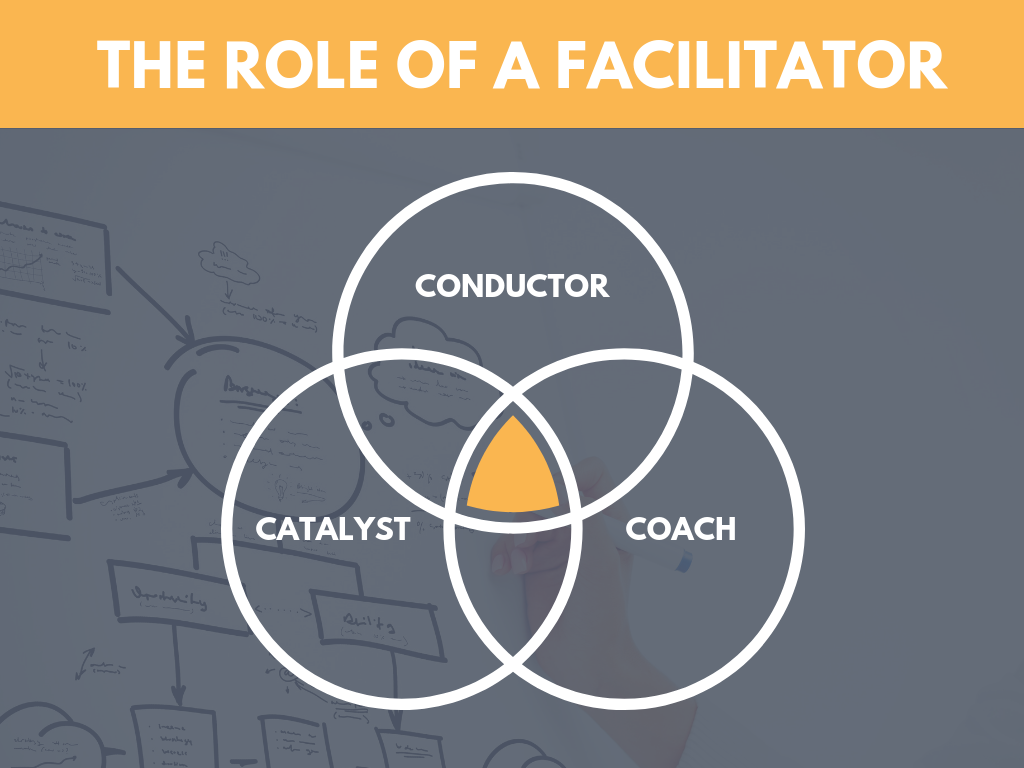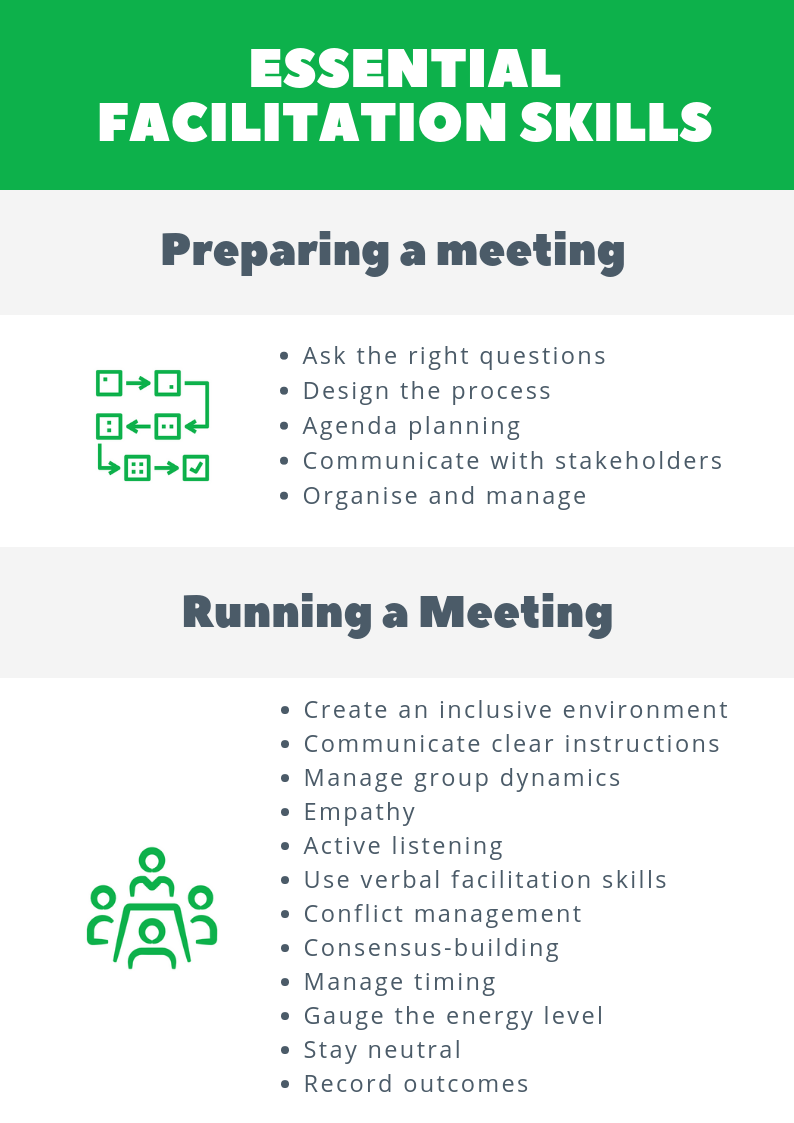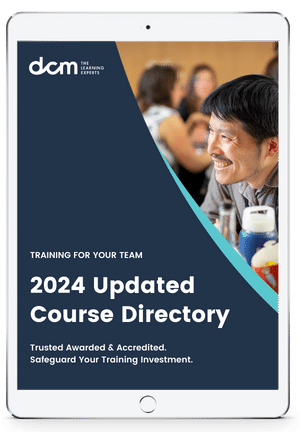What is facilitation?
If you look up the dictionary definition of facilitation, you will get the following result (from the Cambridge Dictionary): “the act of helping other people to deal with a process or reach an agreement or solution without getting directly involved in the process, discussion, etc. yourself”.
If you research it a bit more, you will see that keywords are centred around leading processes and creating participation while staying neutral. Thus, we can distil our definition further into:
“Facilitation is the art of leading people through processes towards agreed-upon objectives in a manner that encourages participation, ownership and creativity by all those involved”
From this point, it would be an easy shortcut to say that the facilitator is the person doing facilitation. And to expand upon it, according to Google’s definition, a facilitator is a “person or thing that makes an action or process easy or easier”.
These definitions bring us closer to understanding what a facilitator does and what facilitation is, but let’s dig in more into what the actual role of a facilitator is and how group facilitation skills can help teams be more productive.
What is the role of a facilitator?
A facilitator has a wide range of tasks to perform in order to ‘make things easier’ for people who participate in a facilitated discussion:
- Support individuals within a group in understanding their common objectives.
- Help people collectively move through a process.
- Structure conversations and apply appropriate group facilitation techniques to keep discussions effective.
- Foster participation and get people to come up with ideas, thoughts and perspectives that add value.
- Get all individuals in the room to feel like they are in a group with a shared interest.
 Roles of a Facilitator
Roles of a FacilitatorIf we really want to understand the different angles of the facilitator’s role, then the following similes may help. A facilitator can be perceived as:
A ‘catalyst’ for discussion: She makes possible the transformation of input (ideas, opinions) to the desired outcome (refined ideas, decisions, strategies, etc.) without being an active part of the conversation herself.
A ‘conductor’ of an orchestra: She synchronises all the musicians (group participants), optimally guiding the use of their instruments toward the desired result – a harmonic musical expression of the musicians’ complex interactions, creativity, and expertise. As the “conductor” guides the participants, a system is organically created wherein the facilitator helps every individual comply with the agreed-upon rules and norms to be followed. In this way, her efforts enable each person in the “orchestra” to create something greater than themselves.
A ‘coach’: she helps the group form a constructive way of working together, identify its needs and wishes, and reach the outcome they would jointly like to achieve.
Neutrality versus involvement in the content
Ideally, a facilitator should maintain a position of joining the discussion as a neutral party. She simply “makes the conversation happen”, or facilitates, as the name suggests.
Naturally, the facilitator needs to influence the group to help them stay on track but must avoid dictating to it. It is essential that the group feels they have ownership of the outcomes they reach – that they have been guided to find their own solutions, without being told or offered solutions.
Why is a facilitator important?
There are several reasons why the presence of a facilitator can be important for a meeting:
Firstly, the larger a meeting is, the more effort it takes to control and manage. When you sit down with two colleagues to quickly discuss a technical question, you probably don’t need much organisation and planning. But when you have a workshop that takes 2 days with 15 people, it requires infinitely more attention to manage both the preparation and the process. Group facilitation skills help a facilitator be effective in large group settings and coordinate a team with ease.
Having a neutral, external facilitator allows everyone else in the room to get fully involved in the conversation. Let’s take an annual strategic planning meeting as an example, where the manager of the team is present. She has her own ideas about what a good strategy might be for the company; however, so do all the other people in the room! A facilitator naturally has authority over the process of the meeting; if the manager is also facilitating the process, it is easy to mix up their roles as a content contributor and process authority, leading to potential difficulties or tension during discussions. Or to put it differently, as a manager and knowledgeable expert in a group, would you rather want to spend your attention on facilitating the process or contributing to it to come up with a good company strategy? This is why it is useful to have one person fully dedicated to focusing on how the group members are working together, helping them achieve their goals effectively without introducing bias.
The higher the stakes of a meeting, the more important it is to have someone who is a professional at running meetings. Having to repeat a multi-stakeholder meeting because of an unproductive first attempt is both expensive and a big loss of credit to the sponsor of the meeting. A facilitator helps ensure the success of a meeting
Facilitation skills
No one is born an expert facilitator. It is important to work on facilitation skills that will help you become more effective as a facilitator, whether you are working with teams internally or externally. Consider this facilitation skills checklist the start of your facilitation training. Let’s get started!
We have collected below the most important skills that a facilitator needs, divided into two parts of the facilitation process.
- Designing the group process
- Guiding the group through the process and adjusting the process as needed
Let’s review which skills are required for a facilitator to perform effectively in each step of the process:

Facilitation skills for preparing a meeting:
- Asking the right questions
- Process design
- Agenda planning
- Communication with stakeholders
- Organising and project management
Facilitation skills for facilitating the meeting:
- Create an inclusive environment
- Communicate clear guidelines and instructions
- Group dynamics (and group management)
- Empathy
- Active listening
- Verbal skills to facilitate conversations
- Conflict management
- Consensus-building
- Manage timing
- Gauge the energy level of a room
- Flexibility
- Staying neutral
- Recording outcomes
Source: SessionLab
FAQ's
- What are the key roles of a facilitator?
A facilitator plays crucial roles such as guiding discussions, managing group dynamics, ensuring participation, fostering creativity, and maintaining neutrality to help groups reach consensus or make decisions.
- What are essential skills for effective facilitation?
Effective facilitation requires skills like active listening, clear communication, empathy, conflict resolution, time management, and the ability to manage group dynamics and diverse opinions.
- How can I become a better facilitator?
To improve as a facilitator, focus on honing communication skills, practicing active listening, learning conflict resolution techniques, understanding group dynamics, and gaining experience in different facilitation methods.
Inhouse Tailored Training for Your Team
We provide training programs that are developed by industry, for industry. Our range of programs can be delivered in a way that suits the needs of your business to offer your employees learning that is accessible and flexible.
We add value to your business by providing specialised, flexible and scalable training that meets your training needs. As your workforce grows and evolves, our globally certified and industry-validated learning solutions can assess, train and qualify your employees. For more information on how we can help please visit the in-house training page.
Membership, Stay Connected. Stay Relevant.
Completing a program is a point-in-time exercise that delivers huge value, but there is a next step to maintaining the currency of your skills in the ever-evolving professional world.
Membership is the next step.
A unique platform, membership is designed to ensure that you are in tune and up-to-date with the latest tools, trends and developments. Being a member provides just-in-time training and continuous professional development, and an exclusive and evolving content library informed by subject matter experts and industry leaders.




_165x115_fc3.jpg)



